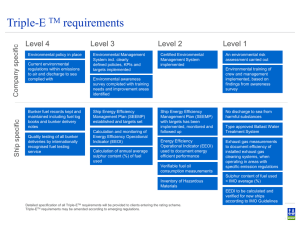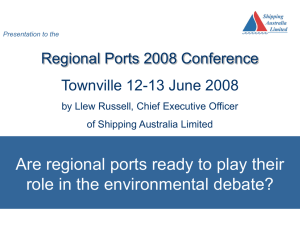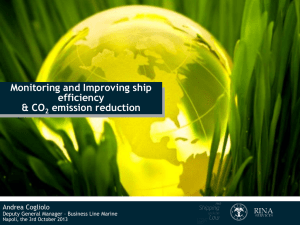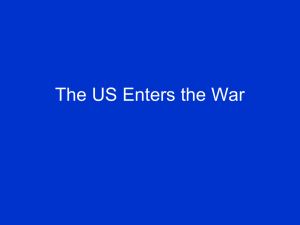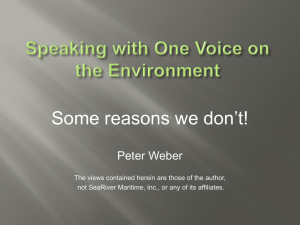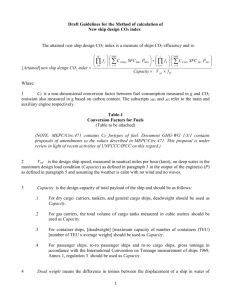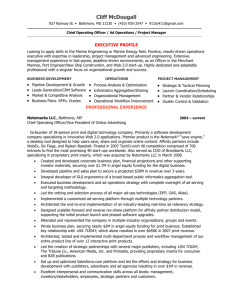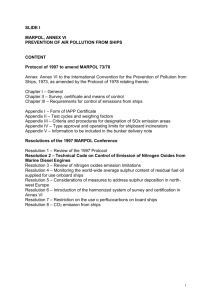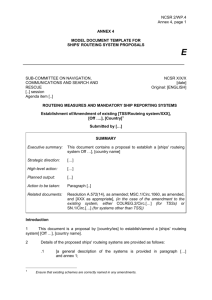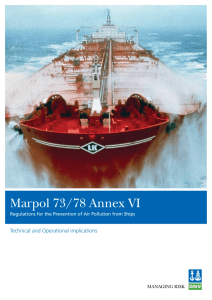PANAMA MARITIME AUTHORITY
advertisement
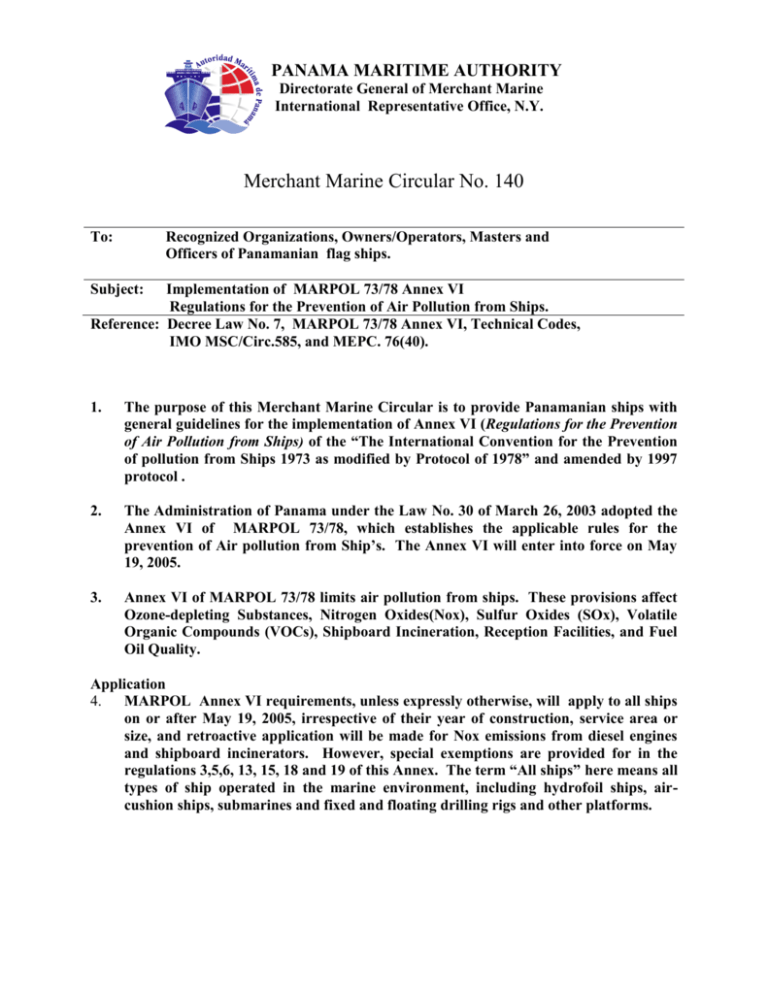
PANAMA MARITIME AUTHORITY Directorate General of Merchant Marine International Representative Office, N.Y. Merchant Marine Circular No. 140 To: Recognized Organizations, Owners/Operators, Masters and Officers of Panamanian flag ships. Subject: Implementation of MARPOL 73/78 Annex VI Regulations for the Prevention of Air Pollution from Ships. Reference: Decree Law No. 7, MARPOL 73/78 Annex VI, Technical Codes, IMO MSC/Circ.585, and MEPC. 76(40). 1. The purpose of this Merchant Marine Circular is to provide Panamanian ships with general guidelines for the implementation of Annex VI (Regulations for the Prevention of Air Pollution from Ships) of the “The International Convention for the Prevention of pollution from Ships 1973 as modified by Protocol of 1978” and amended by 1997 protocol . 2. The Administration of Panama under the Law No. 30 of March 26, 2003 adopted the Annex VI of MARPOL 73/78, which establishes the applicable rules for the prevention of Air pollution from Ship’s. The Annex VI will enter into force on May 19, 2005. 3. Annex VI of MARPOL 73/78 limits air pollution from ships. These provisions affect Ozone-depleting Substances, Nitrogen Oxides(Nox), Sulfur Oxides (SOx), Volatile Organic Compounds (VOCs), Shipboard Incineration, Reception Facilities, and Fuel Oil Quality. Application 4. MARPOL Annex VI requirements, unless expressly otherwise, will apply to all ships on or after May 19, 2005, irrespective of their year of construction, service area or size, and retroactive application will be made for Nox emissions from diesel engines and shipboard incinerators. However, special exemptions are provided for in the regulations 3,5,6, 13, 15, 18 and 19 of this Annex. The term “All ships” here means all types of ship operated in the marine environment, including hydrofoil ships, aircushion ships, submarines and fixed and floating drilling rigs and other platforms. PANAMA MARITIME AUTHORITY Directorate General of Merchant Marine International Representative Office, N.Y. Surveyors are advised to take into account among others, the following main provisions of Annex VI. Ozone Depleting Substances 5. Under Regulation 12 (Ozone Depleting Substances), new installations containing ozone depleting substances are prohibited on all ships, except new installation containing hydrochloroflurocarbons (HCFCs) will be permitted until January 1, 2020. Any deliberate emissions/leakage’s during maintenance, repair and operation of disposal of such substances are prohibited. Instructions shall be establish to ensure that the crew is informed accordingly (e.g.: leaflet in the engine control room). Nitrogen Oxides (NOx) 6. Regulation 13 (Nitrogen Oxides) requires that each diesel engine installed on ship built on or after January 1, 2000 with a power output of more than 130 kW and any existing engine with a power output of more than 130kW that undergoes an major conversion on or after January 1, ,2000 will be issued with the Engine International Air Pollution Prevention (EIAPP) Certificate for each applicable engine, engine family or engine group after the engine demonstrates that the engine complies with the provision of Regulation 13. Major conversion means: (1) the engine is replaced by a new engine built on or after January 1, 2000; or (2) the engine is substantially modified in any way that may increase NOx emissions: or (3) the maximum continuous rating of the engine is increased by more than 10 percent. 7. The EIAPP certification process is to be carried out in accordance with the NOx technical code. For each engine to which Regulation 13 applies, a Technical File originally approved by the ship’s flag State Administration shall be available onboard the ship together with the IAPP Certificate. The Technical file shall contain information necessary for recurrent surveys 8. The Regulation 13 does not apply to: Emergency Diesel Engines or Diesel Engines solely used in emergency case; Engines installed on board ships trading in jurisdictional waters of a Member State with the condition that those engines are subject to be controlled by other measures established by the Administration. 9. The Interim EIAPP Certificate (Statement of Compliance) issued before the date of entry into force of Annex VI of MARPOL 73/78 in accordance with IMO Interim Guidelines for the application NOx limits (MEPC/Circ.344) will be recognized and transferred into official EIAPP Certificate after May 19, 2005. PANAMA MARITIME AUTHORITY Directorate General of Merchant Marine International Representative Office, N.Y. Sulphur oxides 10. Regulation 14 (Sulphur oxides) requires that the sulphur content of any fuel used on board in general shall not exceed 4.5% m/m. Ships trading within SOx emission control areas, shall fulfil at least one of the following conditions: (i) Use fuel oil with sulphur content of max. 1.5% m/m; (ii) Use an approved exhaust gas cleaning system to reduce the ship’s total Sox emission to bellow 6 g/kwh; or (iii) Use another technological method to reduce Sox emission to bellow 6 g/kwh. (iv) For ships using more than one type of fuel, sufficient capacity of low sulphur fuel shall be provide and sufficient time to flush the fuel piping system after switching over. Additionally, the switching over to low sulphur fuel shall be recorded (i.e. number/volume of tanks containing low sulphur fuel, time and positions of begin and end of switching over. At entrance into Sox emission control area, the ship must operate on low sulphur fuel oil. Volatile Organic Compounds (VOC) 11. Regulation 15 states that VOC from tankers are to be regulated in ports or terminals under the jurisdiction of a party of protocol 1997. Therefore, all tanker which are subject to vapor emission control when entering such ports or terminals shall ensure that the ship is provided with a vapor collection system taking into account the IMO safety standards (MSC/Circ.585). Shipboard Incineration 12. Regulation 16 (Shipboard Incineration) requires that incinerators installed on or after January 1, 2000 shall meet the limits detailed in Appendix IV of the Annex VI, must be of approved type and certified In accordance with the requirements of IMO Resolution MEPC 76(40). 13. Incinerators installed before January 1, 2000 may continue in service, provided that no changes have been made which influence the emission characteristics. With the exception of paragraph 14. 14. Ship board of sewage sludge and sludge oil generated during the normal operation of a ship may take place in the main or auxiliary power plant or boiler, but in those cases shall not take place inside ports, harbors or estuaries. Owners/master shall ensure that all Crew members responsible for operation of any incinerator on board shall be informed about the applicable requirement of Regulation 16. PANAMA MARITIME AUTHORITY Directorate General of Merchant Marine International Representative Office, N.Y. Fuel Oil Quality 15. Regulation 18 set requirements for fuel oil for combustion purposes to be delivered and used on board ships. In this regard, for each fuel oil delivered to be used on board as bunker, a delivery note must be issued and must comply with the appendix V of Annex VI; and must be kept on board for at least 3 years and representative sample of the bunkered fuel oil must retained under the ship’s control until the fuel oil is substantially consumed, but in any case not less than 12 months. The representative sample of fuel oil must be sealed and signed by the Supplier of the fuel oil and the Master of the ship or the duty officers in charge of bunker operation. For the purpose of bunker suppliers operating in Republic of Panama the bunker fuel oil sample must be taken according to the guidelines established in the resolution MEPC 96(47) Certificates and records which are to be retained on board. 16. They are described below: Engine International Air Pollution Prevention Certificate ( EIAPP) or “Statement of Compliance” on / or after May 27, 2005; (ii) Technical file, when required; (iii) Record book of Engine parameters (when required); (iv) Operation manual for onboard direct measurement and monitoring methods (when required); (v) Operation manual for vapor collection system (when required); (vi) Operation manual for shipboard incinerator (when required); (vii) Bunker delivery notes; and (viii) Log Book. (i) Survey and Certification 17. Regulation 5 requires that all ships of 400 gross tonnage and above, fixed and floating drilling rigs and other platforms must be provided with the IAPP Certificate after the applicable surveys process. The MARPOL Annex VI surveys are a set of inspection to ensure that ships and engine comply with the Annex requirements. Surveys and certification as regards the enforcement of the Annex VI will be carried out by the Recognized Organizations (ROs) duly authorized by this Administration, the procedures shall follow the standards given in the revised Annex IV. Panama administrative procedures related to the control of the certification will be similar to the guidance previously established by this Administration. PANAMA MARITIME AUTHORITY Directorate General of Merchant Marine International Representative Office, N.Y. Note: In addition to the specific Annex VI requirements, ship-owners will also need to ensure that the various operational requirements of the Annex are implemented and verifiable. Consequently, those ISM procedures covering refrigeration, fire fighting system, incineration and bunkering will need to have updated, as necessary in addition to those required to cover aspects of the NOx and Sox controls. Authorized Organizations acting in our behalf are requested to act accordingly. May, 05 Inquiries concerning the subject of this Circular or any request should be directed to: Directorate General of Merchant Marine, New York Office International Representative Office 6 West 48th Street, 11 floor New York, NY 10036 U.S.A. Phone: ++1 (212) 869-6440 Fax: ++1 (212) 575-2285/2288
